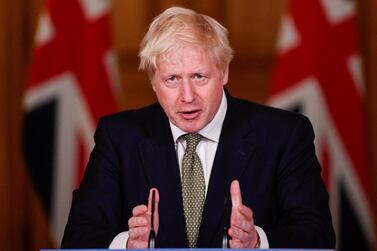Moody's Investors Service on Saturday cut the UK's credit ratings as the world's sixth-largest economy grapples with weak economic growth amid an absent post-Brexit deal and a rising number of coronavirus cases.
The ratings agency – which downgraded long-term issuer and senior unsecured ratings to Aa3 from Aa2 – cited weaker growth, eroding fiscal strength and a weakening in its institutions and governance for its most recent cut.
"The coronavirus-induced shock has brought new and considerable pressures on the UK economy. Despite the projected recovery, we estimate a sharper peak-to-trough contraction for the UK than for any other G20 economy because of the relatively greater severity of the coronavirus outbreak, the reliance of the UK economy on service activities which involve greater levels of human interaction, and the continued risk of further outbreaks and localised restrictions," Moody's said.
The coronavirus pandemic has hit Britain hard, leading its economy to shrink by about a fifth in the first half of this year, far bigger than any previous contraction on record, according to the Office for National Statistics. Meanwhile, the unemployment rate rose to 4.5 per cent in the three months to August, its highest in more than three years despite the government's £190 billion ($247.86bn) package of support and comprehensive plan to protect jobs.
The UK's economy is set to shrink 9.8 per cent, a notch down from a previous 10.2 per cent contraction forecast, according to the latest World Economic Outlook from the International Monetary Fund.
The UK, which left the EU in January and is in a transition period, have been locked in complex negotiations to keep €1 trillion worth of annual trade free of tariffs or quotas from 2021. However, talks with the EU have been at an impasse since UK Prime Minister Boris Johnson has been seeking a trade deal similar to the one secured by Canada, with a few tariffs on goods. But that has proven difficult to strike with the bloc's leaders, leading to a possibility of a no-deal Brexit that could render all previous trade agreements null.
Moody's added that the uncertainty surrounding Brexit could further hamper any economic recovery in the country during the second half of this year.
"The structural impact of the coronavirus-induced shock will be uncertain for some time, but in view of the impact on investment and the labour market to date, some permanent scarring on the economy appears likely."
Moody's, which previously had a negative outlook on the UK, said it had changed the outlook to stable.
"The stable outlook reflects Moody's view that the upside and downside risks are balanced, at least over the coming 12 to 18 months. The UK's intrinsic economic and institutional strengths, as well as the likely level where debt will stabilise, compare well to peers at the Aa3 rating level," the agency said.







